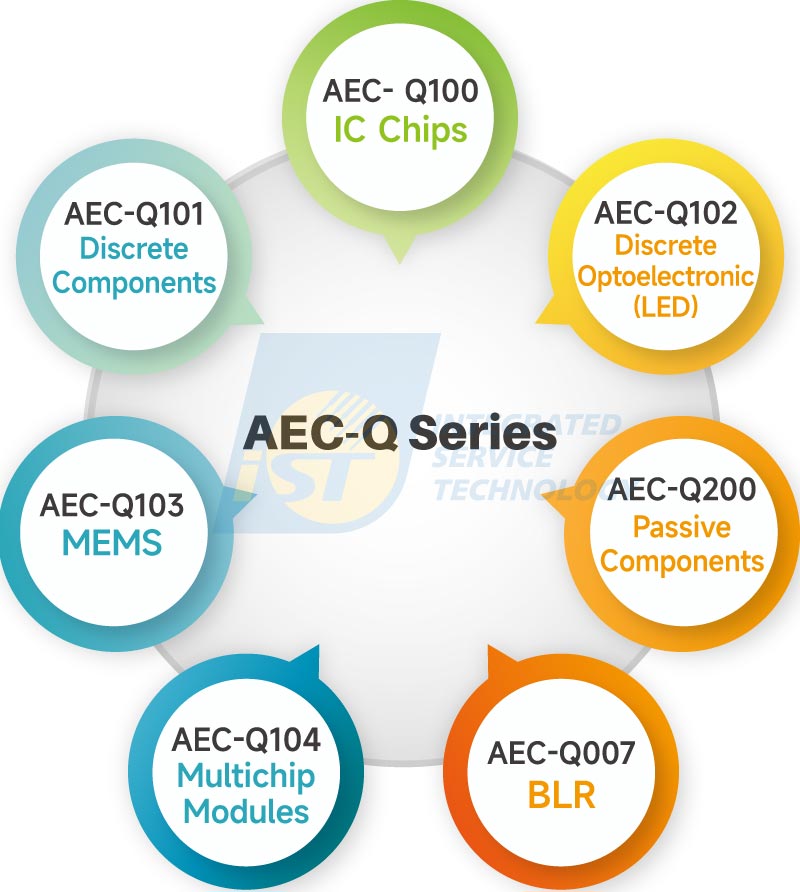Reliability and safety are essential in automotive electronics, and the AEC-Q standards ensure components meet the highest benchmarks for performance under harsh conditions like extreme temperatures and vibrations. These standards cover IC chips, MEMS, multichip modules, and passive components, providing a comprehensive framework for automotive electronics. As an official Automotive Electronics Council (AEC) member, iST leverages its expertise to deliver one-stop, integrated testing solutions tailored to meet these stringent requirements.
Key AEC Standards Driving Automotive Reliability
AEC-Q100 for Integrated Circuits and Automotive: The AEC-Q100 standard sets strict reliability benchmarks for integrated circuits (ICs) used in automotive applications. These requirements ensure ICs can withstand the demanding conditions of vehicle operation, including wide temperature ranges, electrical stress, and environmental challenges, making them essential for everyday vehicle performance and safety.
Multichip Modules (MCMs) Verification: AEC-Q104 extends reliability testing to multichip modules (MCMs), a critical component in modern automotive electronics. Unlike earlier standards that primarily targeted individual components, AEC-Q104 integrates MCMs into the testing framework through BLR validation. This approach examines solder joint performance and material properties under various stressors, enabling comprehensive data collection. These insights serve as a foundation for future design improvements and provide end-users with detailed reference information to enhance reliability and performance.
AEC-Q007 Board-Level Reliability (BLR) Testing:
AEC-Q007 is the first automotive electronics reliability standard to define the solder joints to connect onto/with printed boards (PB) for automotive electronic components. Prior to its release, AEC standards primarily focused on component-level reliability assessments. While AEC-Q104 mentions board-level reliability (BLR) testing in Test Group H, it provides only limited guidance and lacks detailed specifications for PCB and Daisy Chain design. The introduction of AEC-Q007 marks a significant milestone by officially including PCB-level evaluations in automotive reliability testing.
However, compared to comprehensive Board-Level Reliability (BLR) testing, AEC-Q007 focuses on evaluating the durability of solder joints during Temperature Cycling Tests (TCT), whereas a full BLR testing framework includes evaluations across three key stress conditions: Temperature Cycling Test (TCT), Vibration (VB), and Mechanical Shock (MS). Despite this limitation, AEC-Q007 remains a constructive step forward in enhancing the understanding of PCB reliability in automotive applications. By incorporating PCB-level testing, AEC-Q007-001 provides deeper insights into component interactions and failure mechanisms under thermal fatigue, ultimately improving long-term reliability.
AEC-Q007-001 provides a deeper understanding of how components interact and fail under thermal fatigue, enhancing long-term reliability.
The Superiority of iST
- We’re proud to share that iST is recognized as an official member of the Automotive Electronics Council. This recognition underscores our commitment to quality and reliability in automotive electronics.
- With nearly 30 years of experience in reliability verification and failure analysis, iST stands as a pioneer in the field. Our extensive experience ensures each project is handled with expertise and precision.
- Trusted by industry leaders, iST is the designated lab for Tier 1 brands like Continental Automotive and Delphi.
- iST isn’t one to just follow trends; we’re actively shaping them. By participating in AEC's Technical Committee, we contribute to evolving standards and stay ahead of market trends.
- Navigating the automotive electronics sector can be complex. iST provides cutting-edge quality control insights to semiconductor companies, helping them succeed and innovate in this competitive market.
Test Conditions
| Parameter | Consumer | Automotive |
|---|---|---|
| Operating Temperature | 0 ℃ /-65 ℃ ~ +60/+150 ℃ | -40 ℃ /-65 ℃ ~ +85 ℃ /+175 ℃ |
| Operation Life Time | 1~3 years | Up to 15 years |
| Tolerable Failure Rates | < 10% | Target: Zero failure |
| Supply Quality | 2 ~ 3 years | Up to 15 years |
| Humidity | 30% ~ 85% | 0% ~ 100% |
| Temp. Cycles/Shock | Low | High |
| Vibration | Low | High |
| Shock | Low | High |
| EMC(EMI) | Not required | Worse |
| ATE Temperature | Not required | Low/Room/High |
| Production monitoring | Not required | Yes |
Implementation and Compliance
Automotive IC manufacturers integrate AEC-Q standards into reliability testing processes through robust frameworks addressing thermal, electrical, and environmental stress tests. These evolving standards ensure ICs meet the growing complexity and performance demands of modern automotive electronics, guaranteeing reliability under diverse conditions. Regular updates align with technological advancements, reducing failure rates and recalls while maintaining safety and innovation.
iST, as an AEC-accredited member, actively participates in developing these standards, staying informed on global testing practices. This expertise helps manufacturers meet industry demands, ensuring long-term product reliability and safety. For Asian IC design and semiconductor companies, iST provides essential guidance for aligning with international standards and accessing competitive automotive markets.
FAQ
Is IC design house required to conform to IATF 16949?
The IATF 16949 is the automotive manufacturing industry exclusive management system covering product design, development, production, installation, and service on site. That is, facilities with production and manufacturing lines. The IC design industry is not covered by IATF 16949 as it has no production line. However, in order to meet the MAQMSR( minimum automotive quality management system requirements for sub-tier suppliers) , IC design houses are required to design and develop products according to the five core tools of AIAG (Automotive Industry Action Group). In addition, all the contractors of IC design houses who support the industry for production and manufacturing are mandatory to be compliant with IATF 16949 and the IC design houses are required to monitor the supply chain during mass production in the future.
What certificates are required by IC design houses?
The IECQ AQP (Automotive Electronics Quality Certification Program) is designed for IC design houses unable to pursue IATF S16949 certification. This program focuses on verifying the quality and reliability of electronic and electrical components.
Through joint monitoring and testing with third parties, the program ensures that the verification results meet standard requirements.
This, in turn, allows IC design houses to demonstrate their product's quality and reliability to automotive manufacturers or customers, indicating compliance with the relevant certification program requirements.

